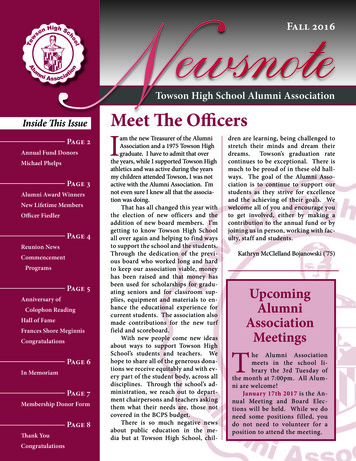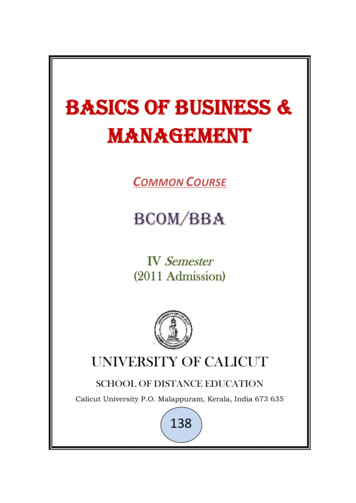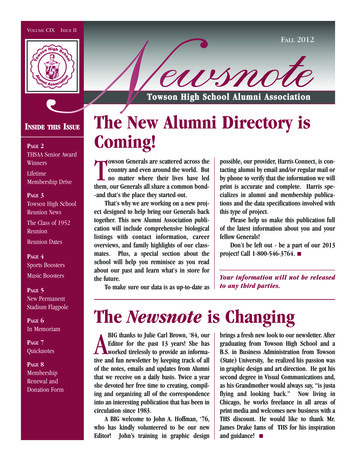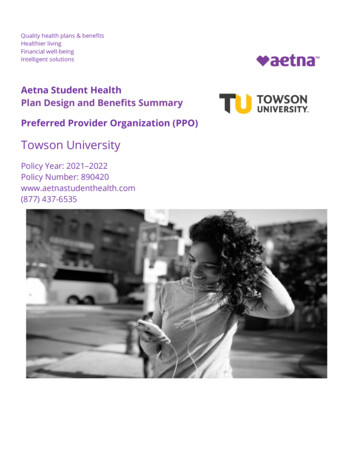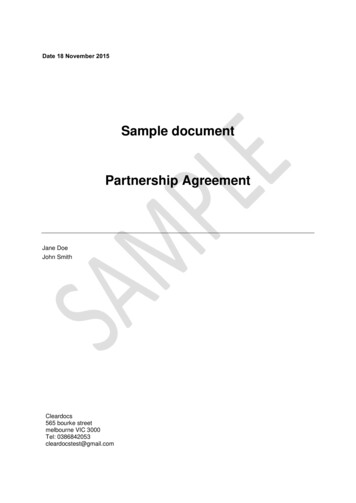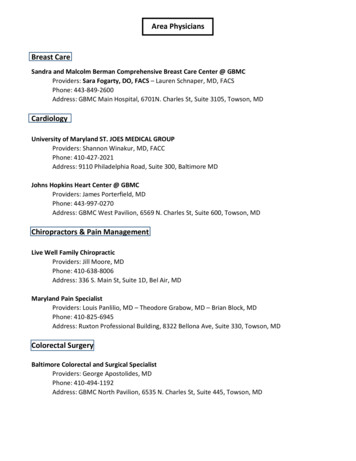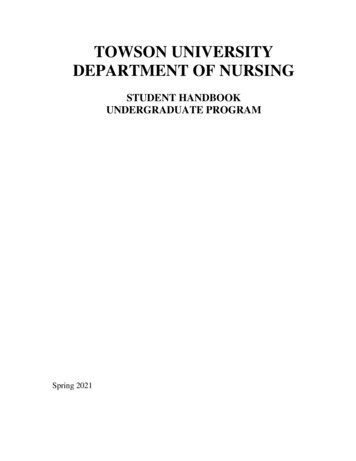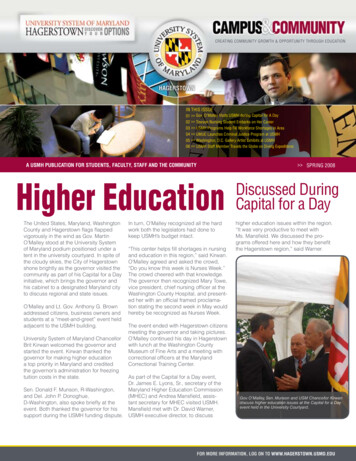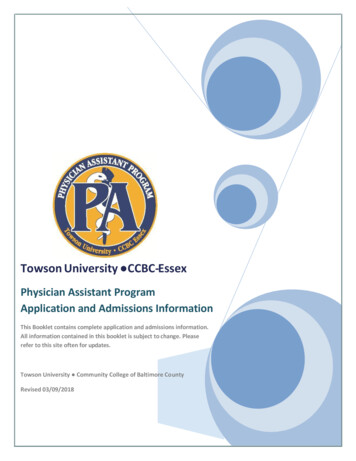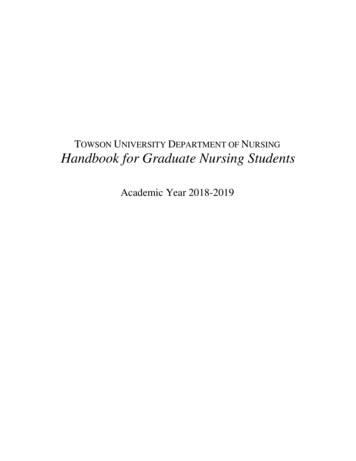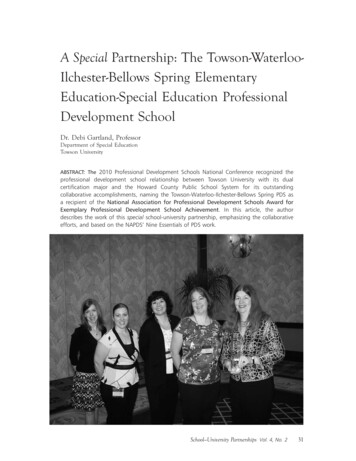
Transcription
A Special Partnership: The Towson-WaterlooIlchester-Bellows Spring ElementaryEducation-Special Education ProfessionalDevelopment SchoolDr. Debi Gartland, ProfessorDepartment of Special EducationTowson UniversityABSTRACT: The 2010 Professional Development Schools National Conference recognized theprofessional development school relationship between Towson University with its dualcertification major and the Howard County Public School System for its outstandingcollaborative accomplishments, naming the Towson-Waterloo-Ilchester-Bellows Spring PDS asa recipient of the National Association for Professional Development Schools Award forExemplary Professional Development School Achievement. In this article, the authordescribes the work of this special school-university partnership, emphasizing the collaborativeefforts, and based on the NAPDS’ Nine Essentials of PDS work.School—University Partnerships Vol. 4, No. 231
32DEBI GARTLANDFigure 1. Professional Education Courses in the Elementary Education - Special Education MajorAt the request of the Maryland State Department of Education, Towson University createdan Elementary Education-Special Education(EESE) undergraduate major leading to dualcertification, which serves as a model for otherMaryland Institutions of Higher Education(IHE). This unique major is a collaborativeprogram between the Elementary Educationand Special Education departments. Prospectivestudents apply for the four-semester programtoward the completion of their general education requirements [see Figure 1 for professionalcourse of study]. Towson University, with itslong history of teacher education, graduates notonly the largest number of general educationteachers in the State, but, due in great part tothe EESE major, now graduates the largestnumber of special education teacher candidates,too. EESE is the fasting growing major in theCollege of Education and one of the fastestgrowing majors at the University.Because of our experiences and successes increating one of the first neighborhood schoolSpecial Education PDSS in the country almost14 years ago, Towson University and theHoward County Public School System againpartnered to develop a unique PDS for theEESE major, known as the TWIBS EESE PDS,with Waterloo Elementary School, IlchesterElementary School, and Bellows Spring Elementary School. We are currently in our 6th year,with 19 TWIBS EESE PDS interns slated tograduate in May 2011. Although interns in eachof our large cohorts are able to complete theirgeneral education rotation internships in one ofour three ‘‘anchor’’ schools, most of our internscomplete their special education rotation internships in other Howard County schools,which we refer to as our PDS ‘‘satellite’’ schools.
A Special PartnershipBackground on the EESE MajorIn Maryland, there are four types of specialeducation certification: vision; hearing; multiple/severe needs; and, Generic Special Education, with a choice of three age/grade levels. AtTowson University, we offer majors in GenericSpecial Education. Undergraduate studentsmajor in one of the four programs, or tracks,within our Department of Special Education.Our special education teacher candidates arerequired to chose a concentration for theircoursework and field experiences in either theInfant/Primary (birth to grade 3), Elementary/Middle (grades 1 to 8), Secondary/Adult (grade6 through adulthood), or Integrated ElementaryEducation-Special Education (leading to dualMaryland certification in grades 1 to 8 of specialeducation and grades 1 to 6 of generaleducation) track. All four of the special education programs at our IHE have been accredited/approved by the National Council of Accreditation for Teacher Education (NCATE), theCouncil for Exceptional Children (CEC), andthe Maryland State Department of Education.One of the most subscribed to programs in theDepartment is the integrated Elementary Education-Special Education major, which has morethan quadrupled in enrollment since its inception in the 2005-06 academic year. There arecurrently five cohorts of EESE seniors, including two cohorts at off-site campuses. Due to therapid growth in the EESE major, TowsonUniversity now graduates the largest numberof special education teacher candidates in thestate of Maryland.Description of our EESE PDSThe interns in the EESE program follow a 16week, two semester (fall and spring) academicyear. During the final PDS year, interns completewhat we refer to as an A-B-B-A rotation whereinthey spend eight weeks in general education andeight weeks in special education during bothsemesters. For this rotation sequence, interns areplaced in a general education setting, or ‘‘A’’placement, two days per week for the first eight33weeks of the fall semester and then move to aspecial education setting, or ‘‘B’’ placement, twodays per week for the remaining eight weeks.When they return after winter break for thespring semester, they start back attending theirspecial education (B) placement fulltime, fivedays per week and remain there for another eightweeks. Finally, they end their professionalinternship year by spending the last eight weeksof the spring semester in their general education(A) placement fulltime. We feel that this rotationsequence is beneficial because it allows interns tobecome familiar with classroom routines prior tothe fulltime internship and also providesopportunities for them to see growth in theirstudents over an entire school year. It should benoted that, given such large EESE cohorts (up to24 interns per year), half of the EESE internsbegin in general education for Rotation A whilethe other half begins in special education forRotation A, with all switching fields (to eitherspecial or general education) for Rotation B.Challenges in Preparing SpecialEducators via a PDS ModelBecause Towson University graduates such alarge number of teacher candidates each year, weare required by law to provide a professionaldevelopment school experience (rather than thetraditional student teaching placement). Preparing special education teacher candidates using aPDS model is more challenging than preparinggeneral education teacher candidates.In our experience as PDS partners for theEESE program, we have faced numerouschallenges while building and maintaining ourlearning community that specifically relate toour interns’ special education experiences. Onesuch challenge has been finding sufficientnumbers of qualified and available specialeducators to serve as mentor teachers in anyone school. A second challenge has beenensuring that interns get intensive, extensiveexperiences with students across a variety ofdisability categories and in settings that followthe least restrictive environment continuum.Thirdly, because of the large number of satellite
34DEBI GARTLANDschools that we use in order to provide adequatenumbers of special education mentors, we havefound it difficult to establish a sense of‘‘community.’’ Finally, enticing non-tenureduniversity special education faculty members toget involved in PDS work has been yet anotherchallenge. [For a more in depth description ofthese challenges and specific strategies that wehave developed and found to be effective forovercoming them, please read Sargent, Gartland, Borinsky & Durkan, (2009).] Despite thechallenges, our TWIBS EESE PDS is successfulin preparing highly qualified, highly effective,dually certified teachers equipped with theknowledge, skills, and dispositions necessary toteach all students. What follows is a furtherdescription of this special school-universitypartnership, emphasizing the collaborative efforts, and based on the NAPDS’ Nine Essentialsof PDS work.NAPDS Essential 1A comprehensive mission that is broader in itsoutreach and scope than the mission of anypartner and that furthers the education profession and its responsibility to advance equitywithin schools and, by potential extension, thebroader community.- promote the achievement of rigorous standards by allstudents;- support high quality academic and clinical trainingfor teacher candidates by providing intensiveinternship opportunities;- provide a powerful mechanism for the simultaneousrenewal and professional development of P-12 andhigher education faculties;- serve as centers for the identification and documentation of best practices in teaching and learningthrough inquiry, research and reflection;- support efforts to achieve the strategic goals of theschool system’s strategic plan.Towson University and Howard Countyagreed to collaborate so that Towson’s firstEESE PDS cohort would be hosted in HowardCounty elementary schools. When we createdour collaborative mission statement, we wantedto encompass an inclusive sense of the partnership that reflects all stakeholders’ contributionsand responsibilities to both school-aged childrenand PDS interns:The mission of the Towson-Waterloo-IlchesterBellows Spring (TWIBS) Elementary EducationSpecial Education (EESE) Professional Development School (PDS) is to become a communityof learners where student achievement andaccountability are maximized through a collaborative partnership among all stakeholders.Towson University and the Howard CountyPublic School System are widely recognized PDSleaders in Maryland, at the higher educationand local schools levels, respectively. Each hasbeen involved in the PDS movement inpreparing general education teacher candidatesfor almost 20 years. As such, each has engagednumerous stakeholder representatives to develop mission statements:Thus the goal of our TWIBS EESE PDS isto increase the achievements of ALL studentsand prepare an increased number of teacherswho are experts in content as well as evidencebased strategies for students with disabilities. Were-visit our mission often, encouraging allparticipants to live up to the mission everyday.The mission of the professional education unit atTowson University is to inspire, educate,and prepare educators as facilitators of activelearning for diverse and inclusive communities oflearners in environments that are technologicallyadvanced.A school–university culture committed to thepreparation of future educators that embracestheir active engagement in the school community.The mission of PDSs in Howard County isto employ the collaborative resources of P-12 andhigher education to:NAPDS Essential 2The school staffs of our TWIBS EESE PDSincorporate the interns as full participants of theschool community from the start. The internsbegin their PDS year typically two weeks prior tothe start of the Towson academic year, allowingthem to spend the first week when teachers
A Special Partnershipreturn alongside their mentor, readying for thenew school year and engaging in professionaldevelopment. The interns also are there thefollowing week, when children return for theirfirst week. This is, of course, a hallmark of thePDS experience, getting to spend quality time,developing a relationship with the mentorteacher as well as being ‘‘behind the scenes’’ tosee just what goes into opening a school year.Although interns bemoan the fact that theirsummer is cut shorter than non-education majorfriends, they rave about what they learned thosefirst two weeks during program evaluations.During the teachers’ first week back eachacademic year, interns are given the same schoolhandbooks, resources, and materials all teachersreceive, including coveted school spirit wear!The interns go to all the meetings their mentorsdo that first week, including briefings on newcurricula, policies, forms, and procedures. Theyalso read the cumulative files of each student ontheir mentor’s caseload as well as any Individualized Education Programs and 504 Plans. Theinterns see the mentors toil through schedulesetting, especially challenging when trying to fitin all the specialized instructional hours theirspecial education mentors teach across grades.They see their special education mentorsstarting to forge new collaborative relationshipswith general education teachers with whom theywill co-teach. The interns also spend time settingup classrooms, ensuring sufficient numbers offurniture, texts, and other instructional materials and supplies. A highlight for the interns ismeeting the students and their families at OpenHouse, typically one afternoon at the end of theteachers’ first week. The mentors are wonderfulabout introducing interns as partners in thestudents’ education.Depending on which day the teachers startback in August, we hold a Mentor-Intern Teathe day before the teachers’ contracts begin, asan additional opportunity for mentors andinterns to meet-and-greet and mingle. Thementors give up part of their ‘‘last day off’’ inorder to make the interns feel welcome and allayanxieties. Additionally, the Towson faculty incharge of the PDS year meets with the internsthe day before teachers begin, which serves as an35orientation to their PDS Year. At that meeting,the principal and assistant principal in whoseschool the orientation is taking place will meetthe interns and provide a welcome and overviewof the school. Often they will talk about thecollaborative nature of our partnership andrecount the successes of the EESE graduatesthey have hired from our TWIBS PDS. Arepresentative from the Howard County PDSOffice will also come to provide the interns withbadges and information about such things asdress code, email and social network policiesbetween students and teachers, and access toelectronic curricula.Interns attend professional developmentsessions throughout the year with their mentors,including those on differentiated instruction,cultural proficiency, and designing quality inclusive education. The interns are welcomed atBack-to-School Nights, parent-teacher conferences, and school-based family nights (e.g., MathNight, Literacy Night, and Game Night). Internsare also active participants in various team andschool meetings, such as School ImprovementTeams, Individualized Educational Programs,and prereferral meetings as well as Countymeetings, such as Special Education Team andInstructional Leadership meetings. Throughouttheir PDS Year, interns realize just how committed to the preparation of future educators theirschool staffs are and feel embraced by their activeengagement in the school community.NAPDS Essential 3Ongoing and reciprocal professional developmentfor all participants guided by need.Professional development occurs regularlyfor both PDS IHE and school faculties. Wheneither Towson or Howard County brings innationally-known education speakers, facultiesfrom our PDS are invited to participate.Additionally, Towson’s field experience office,the Center for Professional Practice, holdsregular meetings for IHE faculty, for siteliaisons, and for principals, providing information, materials, and, often, lunch or dinner.Based on needs assessments, Towson offerson-site graduate classes at drastically reduced
36DEBI GARTLANDcosts for school staff. Not only is this moreconvenient and tailor made to meet teachers’needs, but reasonably priced. The courses maybe taught by fulltime Towson faculty or HowardCounty staff hired as adjuncts.Howard County also regularly providesprofessional development opportunities forIHE and school faculties. A countywide mentortraining is offered annually. Bi-monthly meetings of the various IHE Coordinators who havePDSs in Howard County are held, whereinformation, promising practices, and materialsare shared. The Howard County PDS Programalso brings site liaisons together two to fourtimes per year for professional developmentopportunities.Professional development specific to ourTWIBS EESE PDS also occurs. Towson hasprovided sets of professional books for schoolbased book clubs on topics such as differentiated instruction, brain-based strategies, co-teaching between general and special educationteachers, and teaching students who are different from their teachers. Towson faculty andinterns are always welcome to participate. As aTWIBS EESE PDS, we hold community-wideprofessional development sessions. For example,based on a needs assessment last year, it wasdetermined that three afterschool workshopswould be held, one at each of the anchorschools with all staffs and interns invited to allsessions. The topics were: Communicating WithParents; SharePoint Technology; and, ClassroomManagement. Teachers at our TWIBS EESEPDS served as workshop presenters.NAPDS Essential 4A shared commitment to innovative andreflective practice by all participants.In order to provide improved and enhancededucational opportunities for the children attending our TWIBS EESE PDS, IHE and schoolfaculty work together to identify evidence-basedpractices and teach interns to employ themappropriately. TWIBS EESE PDS teachers regularly guest lecture in the interns’ classes andSeminars and alert us to county-wide opportunities that come across the Howard County intra-net. Additionally, school faculty membersassisted IHE faculty in creating EESE syllabiand assignments as well as monitoring tools, suchas the informal and formal observations forms.We review, reflect on, and refine these at variousgovernance meetings.Given the collaborative nature of ourgeneral and special education PDS, mentorsand Towson supervisors work to provide eachintern with on-going opportunities to see coplanning and co-teaching during the Fallsemester in preparation of engaging in thosecollaborative activities during their fulltimeinternship in the Spring Semester. We ensurethe intern gains proficiency in co-teaching withthe mentor, with other interns (purposefullyplacing an intern with a special educationmentor and an intern with a general educatorwho co-teach), and co-teaching with the mentor’s co-teaching partners.TWIBS EESE PDS interns engage in aminimum of 20 hours of service learning as away of giving back to the schools. Interns’service learning activities are often tied toSchool Improvement Plan goals and includeassisting in Homework Clubs, creating tutoringprograms, collecting and organizing studentdata, working with families of English LanguageLearners, and providing games and packets forDecember and summer vacations, based onstudents with disabilities’ individualized plans.Interns also complete an action researchproject, aimed at decreasing student behaviorsinterfering with achievement (see Gartland,2010). These Positive Behavior Support Plansare often so effective that they are continued aspart of students’ Individualized EducationPrograms.NAPDS Essential 5Engagement in and public sharing of the resultsof deliberate investigations of practice byrespective participants.TWIBS EESE PDS IHE and school facultyand interns engage in and routinely reflect uponpromising practices for professional development as well as to strengthen our PDS. PDSparticipants share our work through many
A Special Partnershipvenues. Interns will often present data fromaction research or service learning projects inclass, at School Improvements Team meetings,and at the annual Maryland PDS Conference.Mentors present at Steering meetings, SummerStrategic Planning Institutes or guest lecture ininterns’ classes. Because of the general education-special education collaborative nature of ourPDS, representatives have presented on numerous occasions at the meetings sponsored by theMaryland State Department of Education.TWIBS EESE PDS participants have madeseveral presentations annually at the Professional Development Schools National Conferencesince our PDS’s inception and have included anumerous individuals representing a variety ofPDS roles: interns, mentors, school site liaisons,IHE PDS faculty and PDS supervisors, PDSadministrators, and Howard County PDS Officerepresentatives. In addition to presentation atNAPDS conferences, TWIBS EESE PDS representatives have presented at other nationalconferences, including those sponsored by theCouncil for Exceptional Children, Council forLearning Disabilities, and Teacher EducationDivision. The topics have ranged from how tostart a collaborative general-special educationPDS to increasing student achievements basedon data from interns’ action research or servicelearning to sustaining PDSs when key personnelchange.NAPDS Essential 6An articulation agreement developed by therespective participants delineating the roles andresponsibilities of all involved.Towson University and the Howard CountyPublic School System have a formal, signedagreement entitled the PDS Memorandum ofUnderstanding (MOU). This MOU is a writtenarticulation of the collaborative partnershipbetween the two entities. The mission of thepartnership is to employ the collaborativeresources of Pre-K-12 and higher education to:- Create a collaborative culture and governancestructure to guide the work at each PDS site.37- Provide enhanced preservice experiencesthrough the integration of theory and practicein clinically based teacher education program.- Provide needs based continuous professionaldevelopment, such as courses, conferences,and workshops for inservice teachers andadministrators through on-site PDS relatedactivities.- Provide for inquiry into and refinement ofeffective practices in teaching and learning.- Maximize student achievement.- Disseminate promising practices and structures to the education community.Further, the MOU delineates goals in fiveareas: culturally diverse settings and exceptionallearners; professional standards; representation;placements; and, reporting and evaluation. TheMOU between Towson University and theHoward County Public School System isreviewed and updated, when necessary, everythree to five years.NAPDS Essential 7A structure that allows all participants a forumfor ongoing governance, reflection, and collaboration.As is evident from the graphic representation (see Figure 2) and description of ourTWIBS EESE PDS above, a unique characteristic of the major is that it is a collaborativeventure. Towson faculty members from theElementary Education and Special Educationdepartments have had to work closely to developand implement this integrated major. Ongoingreflection, evaluation, and refinements occur,necessitating continued collaborative efforts.Each year, co-teaching by TWIBS EESE PDSIHE faculty members representing the twodepartments has occurred as a way to modelcollaboration for our interns. Co-teaching hasoccurred since the inception of our PDS, withthe Collaboration and Elementary School Curriculum and Assessment courses. Currently, both Falland Spring semester seminars are co-taught.Similarly, faculty members in our threeanchor schools in both general education andspecial education have had to increase their levelof collaboration in order to shape the TWIBS
38DEBI GARTLANDFigure 2.A Diagram of the Relationship’s Organizational StructureEESE PDS. A course specifically designed forthis dual certification major, Collaboration in theElementary School, emphasizes collaborationthrough co-teaching. School faculties haveincreased their co-teaching in order to provideinterns opportunities to co-teach with mentorsand fellow interns, with positive results forinterns and students.The TWIBS EESE PDS governance structure provides opportunities for regular communication, in which all stakeholders’ opinions arevalued. Management meetings, involving thethree principals, Howard County PDS Programrepresentative, and IHE PDS liaison are heldevery other month. Steering Committee meetings also occur every other month, in the monthsdifferent from Management meetings. AlthoughSteering Committee meetings are open to all(including mentors at our satellite schools, asanother way to create PDS-wide community), wehave established a set committee to includementors (both general and special educators),teachers who are not mentors, an assistantprincipal from each of the three anchor schools,parents, the three site liaisons, and both theElementary Education and Special EducationIHE faculty members. We hold Mentor meetingswhen necessary, with at least one early in theacademic year and Mirror Mentor meetingswhen necessary, with at least one at the start ofthe Internship II semester. At this Mirror Mentormeeting, interns attend, too, so that the interncan meet with both of his/her mentors so thetriad can plan the semester. Additionally,
A Special PartnershipTWIBS EESE PDS holds a Summer StrategicPlanning Institute typically in June to assess theachievements of the past academic year and planfor the next. Steering and Management membersattend and, this too, is open to all PDS-widecommunity members, including interns. Eachyear, the Howard County PDS Program surveysthe mentors to ensure their voices are valued ona number of issues, including governance. Weuse those data to plan for the upcoming year ormake mid-year adjustments. Finally, in order toavoid unnecessary meetings, we use our TWIBSEESE PDS email listserv regularly and arestarting to use wikis.NAPDS Essential 8Work by college/university faculty and P–12faculty in formal roles across institutionalsettings.We articulate formal roles in our TWIBSEESE PDS, aligned with the Maryland StateDepartment of Education’s 2003 ProfessionalDevelopment Schools: An Implementation Manual.We have an IHE PDS liaison who oversees thePDS as well as serves as the Special EducationUniversity Supervisor for Internship I and IIspecial education rotations for all interns.Similarly, we have an Elementary EducationUniversity Supervisor for Internship I and IIgeneral education rotations for all interns. Eachof the three anchor schools has a school-basedsite liaison who often will serve as a mentorteacher, too. Additionally, we have a representative from the Howard County PDS Program,who serves as a liaison from the County.There are also opportunities for boundaryspanning. For example, TWIBS EESE PDSprincipals and teachers have served as TowsonUniversity adjunct professors. Also, a site liaisonon family leave served as an instructor for ourTWIBS EESE PDS courses. Another mentorteacher on leave became our TWIBS EESE PDSElementary Education University Supervisor.Informal roles are also evident such as whenthe University personnel provide materials andguidance on new federal and state specialeducation policy and practices. Additionally,there have been several opportunities when we39have been called upon by other Howard Countyschools or states to consult about PDS. TheMaryland State Department of Education alsocalls upon TWIBS EESE PDS personnel to actas advocates for dual certification programs,working with other IHEs.NAPDS Essential 9Dedicated and shared resources and formalrewards and recognition structures.Towson University and the Howard CountyPublic School System share a variety ofresources, including space and money. TheTWIBS EESE PDS has been fortunate to beable to have a dedicated PDS classroom since itsinception. The interns are getting a moreauthentic experience by having their TowsonUniversity classes taught on-site. We are able toregularly call upon PDS teachers and administrators as well as County specialists to comespeak as guest lecturers, decreasing guests’ traveltime, maximizing instructional time for interns.In terms of sharing monetary resources,Towson and Howard County provide mentorstipends, supplies/materials, and food andworkshop wages for mentor meetings andportfolio reviews. Howard County pays thestipends for each school-based site liaisons whileTowson provides the IHE PDS liaison a 3-creditrelease once in either the Fall or Springsemester. Towson has provided travel moneyfor the NAPDS conference to interns, mentors,and IHE faculty. Howard County has alsoprovided travel money for mentors to attendthe NAPDS conference.Towson and Howard County have pooledresources to provide mentor breakfasts, mentorappreciation gifts, and professional developmentmaterials as a way to formally recognize mentors.Additionally, the 2007 Towson UniversityCollege of Education Alumna of the YearAward went to one of our TWIBS EESE PDSmentor teachers. As the case with many Collegesof Education, we sometimes struggle over whatPDS activities ‘‘count’’ in University Promotion,Tenure, and Merit decisions even though PDSinvolvement is essential for many Towsonfaculty.
40DEBI GARTLANDOur Proudest AccomplishmentsThe TWIBS EESE PDS embraces the NAPDSNine Essentials and clearly has earned the titleof Professional Development School. We areproud of our PDS and its many accomplishments. Because of the unique nature of ourPDS, we know there is no other PDS inMaryland like ours. We are proud of thecontributions we make which increase theachievements of all of our TWIBS EESE PDSstudents, including those with disabilities. Theongoing data indicate that our EESE PDS ishaving a positive impact of the academicachievement and social-emotional/behavioraloutcomes of the children in our PDS.We are proud of our TWIBS EESE PDSgraduates, many of whom are hired as eithergeneral educators or special educators byHoward County Public School System. We arealso proud, only six years into our TWIBS EESEPDS partnership, to see how many graduates arestill teaching in the same school in which theystarted, have earned leadership positions intheir schools, and how several are serving asmentors and/or site liaisons in our TWIBSEESE PDS.We are, of course, tremendously proud thatour accomplishments were recognized at the2010 Professional Development Schools National Conference by naming the Towson-WaterlooIlchester-Bellows Spring Elementary EducationSpecial Education PDS as a recipient of theNational Association for Professional Development Schools Award for Exemplary Profes-sional Development School Achievement. Theaward reinforces our collaborative work in ourspecial school-university partnership.ReferencesGartland, D. (2010). Action research to changestudent behavior (pp. 155–171). In R.P. Pelton(Ed.), Action research for teacher candidates.Lanham, MD: Roman & Littlefield.Maryland State Department of Education. (2003).Professional Development Schools: An Imp
Howard County Public School System again partnered to develop a unique PDS for the EESE major, known as the TWIBS EESE PDS, with Waterloo Elementary School, Ilchester Elementary School, and Bellows Spring Elemen-tary School. We are currently in our 6th year, with 19 TWIBS EESE PDS interns slated to
